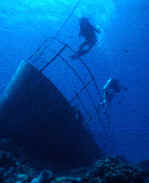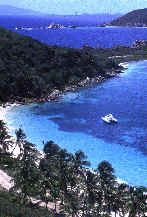PRE-PLANNING FOR HASSLE -FREE CARIBBEAN DIVING
by Larry Larsen, Bass & Caribbean Travel EditorAnglers who don't dive miss the approaches you only develop with underwater time. So consider a dive excursion with, or in place of, your next Caribbean fishing trip.
Traveling to the Caribbean is not much more difficult than journeying to another state. Just two or three hours will put you in the most remote regions. If you're flying to the Bahamas, you'll hardly have time to finish a soft drink before the plane starts descending.
Most places in the islands specialize in a certain type of activity. There are few that can meet everyone's needs, according to M. Timothy O'Keefe, long-time diver and author of the book Fish & Dive The Caribbean. He recommends that you match your desires with what can realistically be offered.
"Don't expect people to go out of their way to cater to your whims," he explains. "You'll be only one of many vacationers, and dive charters are geared to satisfying the largest numbers, not the single few."
Editorial note: You can also combine fishing and diving if you plan properly.
If underwater photography is your primary interest, obviously you'll need to select a spot with good visibility and abundant sea life. If wrecks are your thing, you're more apt to end up in an area swept by winds and turbulent waters, and where photography will be more difficult. If spearfishing is foremost on your agenda, you can just about forget foreign travel and plan on staying at home. Most popular dive destinations ban spearing, since the fish life is one of the primary reasons people visit.
Schools of fish offer a 360 degree surround only divers know.
Other points to consider: Do you and other accompanying members of your family have the experience to be able to dive the different sites a place has to offer? There's no sense in choosing a location where you'll frequently encounter currents and be making deep dives if you or a member of your family is still a novice. You won't be comfortable and you won't enjoy it.
Do you prefer beach or boat diving? Do you want to spend more time snorkeling than scuba diving? Some sites that are great for scuba are lousy for snorkeling because the reefs start too deep to enjoy them from the surface.
How much do the dives cost? Is it cheaper to buy them as a package in advance or pay on an individual basis? But if you do sign up for a package in advance, you're limited to the services of one dive operation, which prevents you from striking out on your own unless the operator will give you a refund for unused dives.
Consider, too, the kind of hotel you want to stay at. Should it be one which is exclusively a dive resort, or would you be happier at a general hotel that offers diving via an arrangement with a dive operation situated off the premises?

Of course, Caribbean diving requires you suffer sun, sea and scenery and makes it hard to go home.
If you want to spend your free time with people who have the same interests and who will be happy to swap tales of their own adventures for yours, you'll probably have a great time at a dive resort. However, if diving is only one of your reasons for visiting a particular place, you might prefer a more general hotel where you'll have a wider variety of subjects to talk about with other guests at breakfast and dinner. But you might also find it more difficult to make friends because of the greater diversity of interests.
Along this same line, would you be happier if you traveled with a group of people you already knew instead of joining a bunch of strangers? If a large dose of familiarity is what you require in an unknown locale, you'll probably feel most comfortable joining a trip offered by the dive shop you frequent at home. That way you know in advance who's going to be present and how compatible the group will be.
Naturally, the best way to learn about a place is talk to someone who's been there. If you're unable to find such a person through your local dive club or dive store, write to the resort and ask them to send some names of previous guests. Then give these former vacationers a call and ask what you need to know. Most people are very helpful as long as your questions are brief and to the point.
Also, read about your destination before departure in order to become thoroughly familiar with an area. Consult not only dive publications for descriptions of the underwater terrain but invest in general travel guides which will give you detailed points about a place, its people and their customs. The more you know in advance, the more you know what to plan for.
When packing time finally arrives, take all your own gear except for tank and weights, which are normally provided. Rental equipment is not likely to be as new or well maintained as your own. Even if it is, it won't provide the same confidence, or psychological advantage, your own familiar equipment does.
Here's what your equipment list should include: regulator with pressure gauge; mask, fins and snorkel; extra mask and fin straps; buoyancy compensator; wetsuit (which may help you even in the tropics against coral, etc.); knife; dive watch; bottom timer; underwater light for night diving; gloves; decompression tables; a basic scuba manual for review.
The suitcase you use to transport your dive gear should have stout locks and hard sides in order to withstand abuse. Soft luggage often won't provide the kind of protection required to thwart clumsy baggage handlers.
Next to your dive equipment, the most important items to carry are remedies for various dive and travel-related ills. For sinus blockage or sticky ears, Sudafeds are widely used since they don't make you drowsy. Also pack some ear wax remover, swimmer's ear medication, sunscreen, Adolph's meat tenderizer for coral scrapes, diarrhea medicine and a simple first aid kit. It's surprising how often you're forced to serve as your own pharmacy because none of the supplies are available.
